|
|
|
Sort Order |
|
|
|
Items / Page
|
|
|
|
|
|
|
| Srl | Item |
| 1 |
ID:
119985
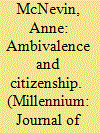

|
|
|
|
|
| Publication |
2013.
|
| Summary/Abstract |
Irregular migration gives rise to political claims that test the limits of political community and the expression of human rights in an increasingly interconnected world. This article provides a theorisation of the political claims of irregular migrants that starts with the notion of ambivalence. I argue that the ambivalence present in such claims can be understood as a political resource that is generative of new political relations across the terrain of human mobility and border control. In order to discern the generative quality of ambivalence, I argue in addition for an approach to theory production that is grounded in concrete migrant struggles. The argument is made via a critique of two theoretical perspectives that are influential amongst scholars working at the intersection of Migration Studies and Political and International Theory: the work of Giorgio Agamben and the 'Autonomy of Migration'. An approach that avoids the reductive accounts of power evident in both perspectives provides a better starting point from which to assess the transformative potential of irregular migrants' political claims.
|
|
|
|
|
|
|
|
|
|
|
|
|
|
|
|
| 2 |
ID:
119990
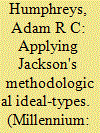

|
|
|
|
|
| Publication |
2013.
|
| Summary/Abstract |
In The Conduct of Inquiry in International Relations, Patrick Jackson situates methodologies in International Relations in relation to their underlying philosophical assumptions. One of his aims is to map International Relations debates in a way that 'capture[s] current controversies' (p. 40). This ambition is overstated: whilst Jackson's typology is useful as a clarificatory tool, (re)classifying existing scholarship in International Relations is more problematic. One problem with Jackson's approach is that he tends to run together the philosophical assumptions which decisively differentiate his methodologies (by stipulating a distinctive warrant for knowledge claims) and the explanatory strategies that are employed to generate such knowledge claims, suggesting that the latter are entailed by the former. In fact, the explanatory strategies which Jackson associates with each methodology reflect conventional practice in International Relations just as much as they reflect philosophical assumptions. This makes it more difficult to identify each methodology at work than Jackson implies. I illustrate this point through a critical analysis of Jackson's controversial reclassification of Waltz as an analyticist, showing that whilst Jackson's typology helps to expose inconsistencies in Waltz's approach, it does not fully support the proposed reclassification. The conventional aspect of methodologies in International Relations also raises questions about the limits of Jackson's 'engaged pluralism'.
|
|
|
|
|
|
|
|
|
|
|
|
|
|
|
|
| 3 |
ID:
119984
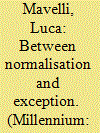

|
|
|
|
|
| Publication |
2013.
|
| Summary/Abstract |
In recent political and scholarly debates, the notion of 'securitisation of Islam' has acquired increasing relevance, yet very little attempt has been made to investigate the theoretical implications of the securitisation of Muslim subjects carried out by secular regimes for thinking security. This article aims to partially fill this gap by exploring the securitisation of Muslim minorities in Western societies as a process of construction and reproduction of secular modes of subjectivity. To this end, the article outlines the contours of an approach to securitisation which draws on both the Copenhagen and the Paris schools of security studies, as well as on a gender/body perspective which focuses on the subjectivities that securitisation aims to produce. Following some illustrations of the securitisation of Islam in the aftermath of 9/11 and 7/7, an exploration of a Western notion of subjectivity revolving around the securitisation of Christianity and the construction of Islam as a threatening deviation from this historical trajectory, and an analysis of the securitisation of the headscarf and the burqa in France, the article concludes that securitisation rests on both logics of political normalisation and exception which warrant an exploration of the discursive sediments which make them possible.
|
|
|
|
|
|
|
|
|
|
|
|
|
|
|
|
| 4 |
ID:
119986
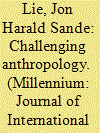

|
|
|
|
|
| Publication |
2013.
|
| Summary/Abstract |
Ethnography and anthropology are intrinsically linked, but recently other disciplines have started to draw inspiration from anthropological methods. The ongoing ethnographic turn in International Relations has spurred debate on what ethnography is, what it means and entails in practice, and how to apply it in International Relations. Some assert that the ethnographic turn could not have taken place without adopting a selective and antiquated notion of ethnography; others counter that this argument draws on a caricatured version of ethnography. This article offers one anthropologist's reflections on these issues, drawing on ethnographic work within an international organisation and a state apparatus - both of which are areas of study more common in International Relations than in anthropology. This is not an International Relations turn of anthropology, but the practical and methodological challenges it involves are relevant to the ethnographic turn of International Relations and the disjuncture between the ethnographic ideals and anthropological practice.
|
|
|
|
|
|
|
|
|
|
|
|
|
|
|
|
| 5 |
ID:
119992
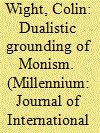

|
|
|
|
|
| Publication |
2013.
|
| Summary/Abstract |
The Conduct of Inquiry is a tour de force that carefully unpacks the idea of 'inquiry' in International Relations and reconstructs debates surrounding this issue in a way Jackson believes will foster genuine debate and, potentially at least, facilitate progress in the discipline. However, it is not without its problems. In this contribution to the forum, I present three challenges to Jackson's position. Firstly, I challenge the validity of the monism-dualism split that he believes underpins all approaches to the field. Secondly, I take issue with Jackson's account of science and methodology. Thirdly, I briefly highlight some problems with Jackson's account of pluralism and argue that it fails to provide the conditions of possibility for 'engagement' that Jackson is so committed to.
|
|
|
|
|
|
|
|
|
|
|
|
|
|
|
|
| 6 |
ID:
119991
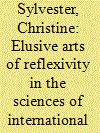

|
|
|
|
|
| Publication |
2013.
|
| Summary/Abstract |
There are a number of highly laudable aspects of Patrick Jackson's broadened discussion of scientific inquiry in the field of International Relations, among them the attention he gives to feminist analysis as exemplary of reflexive science. Yet there are a few worrying elements in his approach as well. This piece addresses issues around Jackson's presentation of feminist analysis and, in addition, tackles his off-handed reinscription of the split between social sciences and the arts (plus his neglect of poststructuralism). Jackson's view of feminist analysis relies on early writings on feminist philosophy of science. He therefore underestimates the goals and the epistemological complexities of current research in feminist International Relations. As a separate but overlapping underestimation, Jackson's drive for a post-foundational science ignores the capacity of the arts to enhance the very qualities of research that attract him to reflexive forms of International Relations science. To overcome both sets of concerns requires enlarging the critical scope of reflexive inquiry.
|
|
|
|
|
|
|
|
|
|
|
|
|
|
|
|
| 7 |
ID:
119988


|
|
|
|
|
| Publication |
2013.
|
| Summary/Abstract |
In his The Conduct of Inquiry in International Relations, Patrick Jackson identifies four distinct ways of studying world politics: 'neopositivism', 'critical realism', 'analyticism' and 'reflexivity'. According to him, they all fall under the broad umbrella of 'science' but they each stem from a distinct philosophical foundation. In his view, which foundation one subscribes to is a matter of faith, which leads him to advocate pluralism. He classifies the underlying philosophical foundations in terms of two criteria: 'mind-world dualism' versus 'mind-world monism' and 'phenomenalism' versus 'transfactualism'. Through a step-by-step analysis of his complex text, I show that what divides (1) neopositivism, (2) analyticism and (3) critical realism and reflexivity (classed together) is not in fact their philosophical foundations but the nature of the questions they ask, each reflecting distinct human interests. Accordingly, while praising Jackson's philosophical vigilance against the dominance of neopositivism, I conclude by pointing to a need to consider the political underpinnings of different modes of knowledge production.
|
|
|
|
|
|
|
|
|
|
|
|
|
|
|
|
| 8 |
ID:
119994
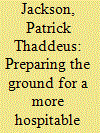

|
|
|
|
|
| Publication |
2013.
|
| Summary/Abstract |
In this reply, I take up three issues raised by the other contributors to this discussion of my book: the purpose of the intervention, the epistemic status of the typology and the question of progress in science.
|
|
|
|
|
|
|
|
|
|
|
|
|
|
|
|
| 9 |
ID:
119987


|
|
|
|
|
| Publication |
2013.
|
| Summary/Abstract |
The past 15 years have seen an explosion of interest in the scholarship of E.H. Carr. As a founding figure of the realist approach to International Relations, as a philosopher of history and as a historian of the Soviet Union, Carr made important contributions. His work on the post-war political organisation of Europe has been somewhat neglected. While not going so far as to argue for the introduction of 'another E.H. Carr' - Carr the European integration theorist - this article argues that Carr's specific brand of realism has much to say not only about the establishment, but also about the subsequent development, of the European Economic Community. Carr's realism was, we argue, capable of understanding change in international society. This understanding was grounded in an appreciation of the role of power and morality in international politics and stands in sharp contrast to the emphasis on the structural factors that are prized by neorealists. While Carr's vision of post-war Europe has not materialised in its entirety, it captures some of the crucial fault lines that animate the European project. Building a bridge between European integration studies and Carr's realism will provide a fruitful avenue through which classical realism can once again begin to engage with developments in international politics.
|
|
|
|
|
|
|
|
|
|
|
|
|
|
|
|
| 10 |
ID:
119993


|
|
|
|
|
| Publication |
2013.
|
| Summary/Abstract |
The article looks at one of the central arguments of Patrick Jackson's book The Conduct of Enquiry in International Relations: the attempt to advance methodological pluralism and dialogue among contending metatheoretical schools of International Relations. The article supports the goal of pluralism but argues that there is a significant gap in Jackson's support of it and that his version of pluralism inhibits metatheoretical engagement of different schools of thought. The latter in turn limits the possibility of progress in the field. The article outlines the missing steps in Jackson's argument, the way in which he unduly limits the contribution that the philosophy of science can make to scientific progress and an alternative argument for pluralism that leaves a role for genuine philosophical engagement and the possibility of progress in IR.
|
|
|
|
|
|
|
|
|
|
|
|
|
|
|
|
| 11 |
ID:
119989
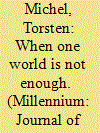

|
|
|
|
|
| Publication |
2013.
|
| Summary/Abstract |
This article evaluates Patrick Jackson's recent book The Conduct of Inquiry in International Relations. Jackson delivers a thoughtful and timely contribution to meta-theoretical debates in International Relations by highlighting the diverse landscape of incompatible philosophico-ontological positions. Specifically discussing the practical pay-offs of Jackson's taxonomy, the article, though generally sympathetic to Jackson's account, argues that he overlooks three interconnected areas: the myth-historical character of 'International Relations', the semantic heterogeneity or polysemy of his taxonomical categories, and the scope and nature of translation necessary to sustain his suggested methodological pluralism. These shortcomings question the stability and practical usefulness of his taxonomy and call for a more versatile, less static delineation of philosophico-ontological positions and an embrace of a plurality rather than a pluralism in International Relations meta-theory.
|
|
|
|
|
|
|
|
|
|
|
|
|
|
|
|
|
|
|
|
|